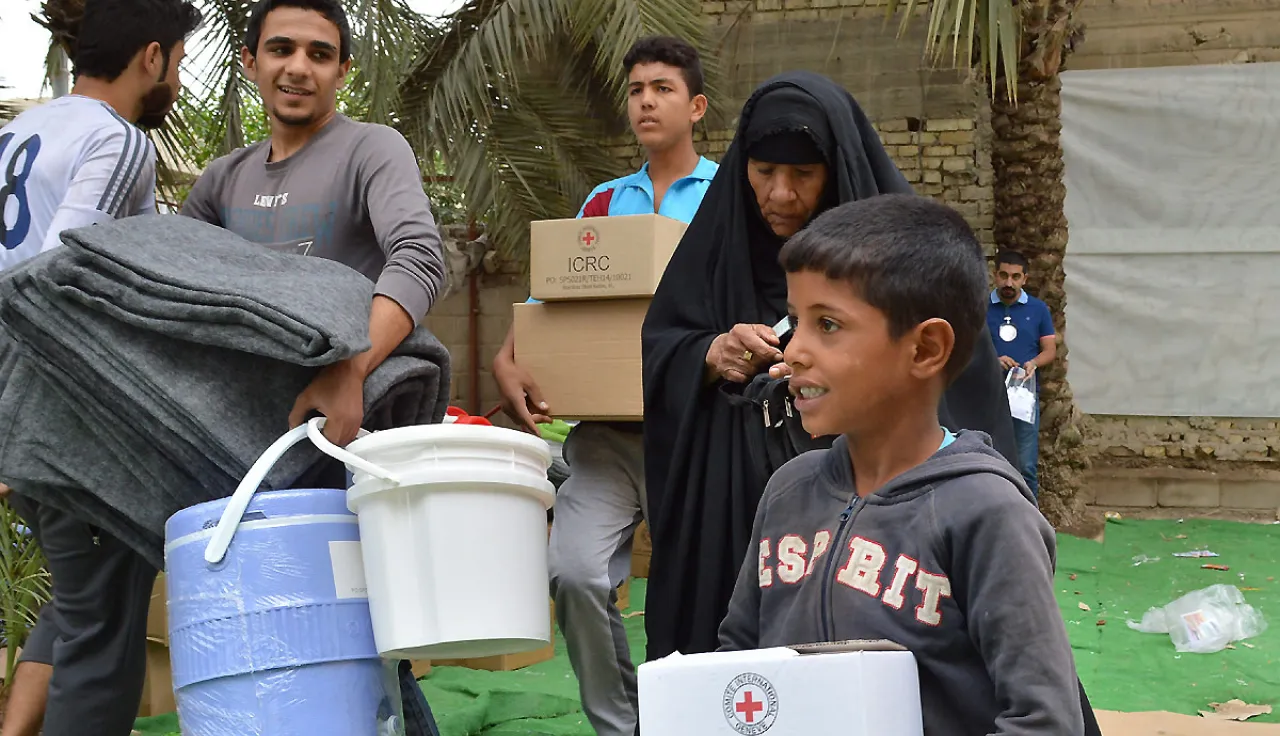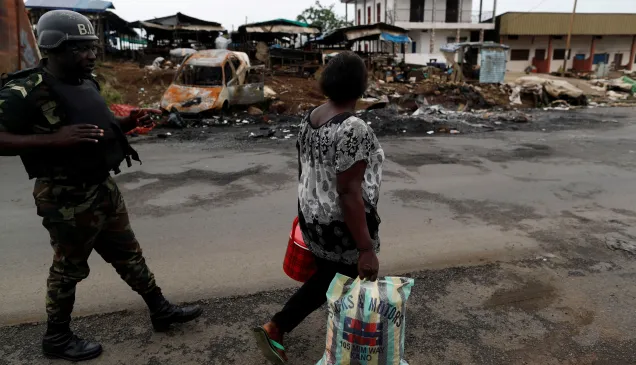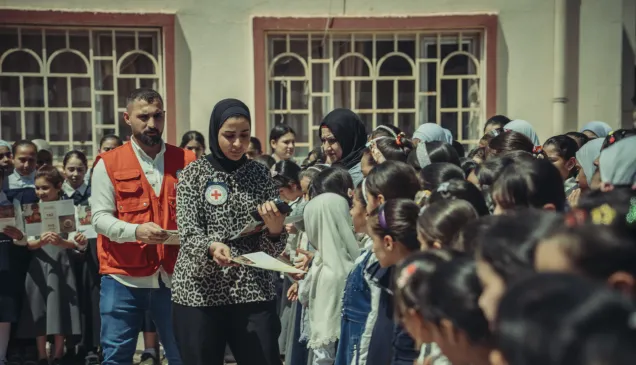Iraq: ICRC scales up activities to help over 1.5 million people

As armed conflict expands in Iraq, the ICRC is stepping up its humanitarian work. It has brought food and other aid to more than 1.5 million people since January.
The expansion of armed conflict to different parts of Iraq has resulted in yet another wave of massive displacement. The arrival of the rainy season and the approach of winter are making the lives of displaced Iraqi civilians more and more miserable. In response, the ICRC is scaling up its activities. It is preparing to deliver supplies to help over 40,000 people make it through the winter, and carrying out activities across front lines to address the needs of people living in conflict-stricken areas. It has brought food and other aid to more than 1.5 million people since January.
Conflict causes more displacement and suffering
The ongoing fighting in different parts of Iraq has resulted in the displacement of more than 1.8 million people. Thousands have died and many more thousands have been injured. "In Iraq, displaced civilians have been caught in the fighting, low on supplies, running for safety, and stranded at checkpoints or in makeshift shelters and camps," said Patrick Youssef, head of the ICRC delegation in the country. "After bearing the heat of summer, they are now enduring the rain and freezing winter weather. Their plight has been heart wrenching."
So far, the ICRC has distributed one-month food rations and other relief items such as blankets, tarpaulins, jerrycans and kitchen sets to more than 400,000 displaced people in 118 locations in 15 of the country's 18 provinces. In addition, to restore the ability of conflict-affected people to earn a living, the ICRC is currently distributing about 1,800 metric tonnes of seed and fertilizer to over 5,000 farming families in the provinces of Babel, Karbala, Baghdad, Diyala, Kirkuk and Ninewa.
"The tragic, never-ending loss of civilian lives, and destruction of property essential for their survival, remains a matter of serious concern for the ICRC," said Mr Youssef. "Civilians and civilian objects are protected under international humanitarian law. We continue to remind all parties to the conflict, including the new international coalition and armed groups, of their obligation to spare civilians and their property, and to allow humanitarian organizations unimpeded access to them. Furthermore, the ICRC and the Iraqi government have signed a memorandum of understanding to spread knowledge of and compliance with international humanitarian law with key decision makers."
Crossing front lines to provide health care
The conflict has had a serious effect on health-care facilities in many cities and towns. A number of the facilities have come under attack and suffer from shortages of medicines and supplies. In many cases the absence of medical staff owing to the lack of security has led to disruption in services for the injured and the sick.
"Health-care facilities and staff must be protected from attack," said Mr Youssef. "They must be allowed to function. Everyone without exception must always have access to health care, whatever the circumstances."
The ICRC, which works in a strictly neutral and impartial manner and seeks dialogue with all parties to the conflict, including government authorities, community, tribal and religious leaders and other groups, has succeeded in delivering medicines, surgical instruments, bandages, intravenous fluids and other items to 66 health-care facilities in 10 cities: Mosul, Erbil, Dohuk, Hamdaniyah, Sinjar, Fallujah, Hawijah, Tooz, Najaf and Basrah. The supplies are sufficient to cover the needs of over 170,000 people. Additionally, the ICRC physical rehabilitation centre in Erbil and eight other ICRC-supported centres together serve over 23,000 people with disabilities.
Clean water for displaced people and residents
One of the ICRC's priorities in Iraq is to make sure that people have water that is safe to drink. Since the beginning of the year, the organization has provided clean drinking water for nearly 920,000 people, more than 200,000 of whom are displaced. This has been achieved by installing new water facilities and upgrading existing ones for host communities while also delivering water by truck and installing additional storage and distribution points for displaced people.
"The conflict has also had an effect on water resources," said Mr Youssef. "Because water is essential to human life, it is imperative that it be protected by parties to the conflict." Whenever possible, the ICRC has also repaired water resources destroyed as a result of fighting.
Detainees still a concern for the ICRC
The ICRC continues to visit places of detention under the authority of the Iraqi national government and the regional government in Kurdistan. The purpose of the visits is to improve conditions of detention, help detainees establish and maintain contact with their families, and provide them with hygiene products and other necessary items. Meanwhile, by means of confidential dialogue with the authorities, the ICRC strives to ensure that detainees are treated in a dignified manner.
"We continue to monitor the conditions of thousands of detainees in Iraq, including foreign nationals," said Elpida Papachatzi, an ICRC delegate in charge of detainee-welfare activities. "During the last few months, thousands of detainees have been transferred to different prisons. We are therefore helping them to maintain contact with their families. Under the law, detainees must be treated with dignity. We will continue to monitor their situation and maintain confidential dialogue with the detaining authorities."
Since the beginning of the year, the ICRC has:
- made 131 visits to 61 places of detention holding 32,971 detainees;
- provided over 14,750 detainees with basic items such as clothes, hygiene products and blankets;
- facilitated the exchange of 3,056 Red Cross messages between detainees and their families;
- made 5,184 telephone calls briefly informing family members of the well-being of their detained relatives.
Still looking for missing people
Armed conflict in Iraq, past and present, has resulted in tens of thousands of people going missing. The ICRC chairs the meetings of the committees responsible for accounting for people who went missing in connection with the 1980-1988 Iran-Iraq War and with the 1990-1991 First Gulf War. The aim is to shed light through high level meetings with the concerned governments on what happened in order to relieve the suffering of the families, who still do not know what became of their missing loved ones.
Since the beginning of the year, the ICRC has facilitated three joint Iraqi-Iranian missions in the south of Iraq, where the remains of 338 people were recovered. Subsequently, in three handover ceremonies, the remains of 210 Iranians and 19 Iraqis were repatriated to their respective countries. In addition, by signing a memorandum of understanding with Iraq's Medico-Legal Institute, the ICRC renewed its commitment to expanding the forensic capabilities of the institute by providing it with training and equipment.
Red Cross and Red Crescent commitment to meeting Iraq's humanitarian needs
In response to mounting needs resulting from the armed conflict, the International Red Cross and Red Crescent Movement has intensified its activities. The ICRC, the International Federation of Red Cross and Red Crescent Societies and the national Red Cross or Red Crescent societies of several countries have ramped up their efforts inside Iraq alongside the Iraqi Red Crescent Society. The recent joint visit to Iraq of the director-general of the ICRC and the secretary-general of the International Federation to meet with victims of the armed conflict and learn about their needs, while also seeing at first hand the work carried out by the various components of the International Red Cross and Red Crescent Movement, underlines the Movement's strong commitment and determination to meet humanitarian needs in the country. The ICRC continues to support the Iraqi Red Crescent Society in its efforts to boost its capabilities. In particular, it has provided the society with 12 mini-trucks, cars and forklifts, and has helped it to equip its emergency operational centre with the latest information technology tools.
For further information, please contact:
Saleh Dabbakeh, ICRC Baghdad, tel: +964 790 191 6927
Nadia Dibsy, ICRC Geneva, tel: +41 22 730 37 23 or +41 79 447 37 26



